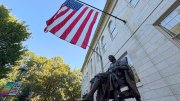President Donald Trump told reporters in the White House Tuesday that a deal with Harvard was imminent, even as his administration announced a new effort to squeeze the University’s finances.
“I guess we reached a deal with Harvard today,” Trump said during an unrelated Oval Office event, turning to Secretary of Education Linda McMahon for confirmation, according to the New York Post and other news outlets. The administration has reportedly been pressuring Harvard to pay $500 million to settle accusations of campus antisemitism and other discrimination; Trump said the deal would involve the creation of trade schools that Harvard would operate. A University spokesperson did not immediately respond to a request for comment.
Meanwhile, in the latest move in the White House’s multipronged assault on Harvard, the U.S. Department of Health and Human Services (HHS) announced on Monday that it was referring the University for “disbarment,” laying the path for the administration to block Harvard from receiving any future federal grants or contracts.
The HHS move represents a new tactic for the government—which, in April, had simply announced that it would cancel more than $2.2 billion in already-awarded grants and contracts as punishment for a campus culture that was politically imbalanced and led to the harassment of Jewish and Israeli students. In response, Harvard sued, arguing that the government had violated its First Amendment rights.
In early September, District Judge Allison Burroughs ruled in Harvard’s favor in a Boston federal court; millions of dollars in grant funding have since begun to flow back to University labs and offices, though the Trump administration has vowed to appeal the decision.
The latest HHS move affects future grants, and the immediate recourse seems to reside within the department itself. In a statement, HHS said an administrative law judge will “make an impartial determination” on whether Harvard violated the Civil Rights Act of 1964 by “acting with deliberate indifference towards antisemitic student-on-student harassment” following the October 7, 2023, terrorist attacks on Israel.
Harvard has 20 days from the date of the announcement to notify the department whether it will exercise its right to a hearing. A Harvard spokesperson did not respond to a query about the University’s plans.
The department’s Office for Civil Rights (OCR) had sent Harvard a notice in June, announcing that the University had violated civil rights law. The New York Times reported on Tuesday that Harvard sent a caustic, 163-page letter to the Trump administration earlier this month, charging that the OCR’s determination was based on flimsy evidence and ignored actions Harvard has taken over the past two years to address campus antisemitism.
A court ruling on pro-Palestinian speech rebukes Trump
Also on Tuesday, a federal judge in Boston excoriated the government for violating the First Amendment, in a separate lawsuit that focused on efforts to deport noncitizens engaged in pro-Palestinian speech.
The ruling from District Judge William Young ’62, LL.B ’67 also hinged on campus culture over the past two years, and on the Trump administration’s efforts to crack down on anti-Israel and pro-Palestinian speech on college campuses nationwide. Filed after the administration attempted to deport some foreign nationals—including a Tufts University graduate student who co-wrote an op-ed in the campus newspaper, accusing Israel of genocide—the suit charged that the Trump administration was carrying out a policy of “ideological deportation,” chilling free expression and creating a climate of fear and repression.
Harvard’s chapter of the American Association of University Professors (AAUP), of which some Harvard faculty are members, was one of three AAUP chapters that served as plaintiffs. At a trial in Boston in July, Harvard philosophy professor Bernhard Nickel, a German citizen, testified that he had stopped speaking out about the war in Gaza due to a fear of reprisal from the Trump administration.
In his 161-page ruling, Young wrote that the government appeared to be punishing pro-Palestinian speech that it did not approve of, rather than speech that contained “incitement to imminent violence or, per the terms of an older test, clear and present danger.” The administration’s goal, he wrote, was to strike fear into noncitizens with pro-Palestinian views: “the effect of these targeted deportation proceedings continues unconstitutionally to chill freedom of speech to this day.”
Calling the case “perhaps the most important ever to fall within the jurisdiction of this district court,” Young noted that it questions whether noncitizens, lawfully present in the United States, share citizens’ First Amendment rights to freedom of expression.
“The Court answers this Constitutional question unequivocally ‘yes, they do,’” Young wrote. “The First Amendment does not draw President Trump’s invidious distinction and it is not to be found in our history or jurisprudence.”
Young wrote that he would hold further proceedings to determine what consequences the government should face for violating the Constitution.








